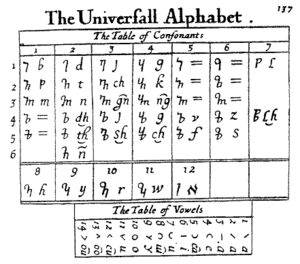Francis Lodwick facts for kids
Francis Lodwick (born 1619, died 1694) was a very clever person from the 1600s. He was a pioneer of what were called 'philosophical languages'. These were attempts to create a perfect, logical language that everyone could understand, like a universal code. He was also a Fellow of the Royal Society, which is a big honor for scientists.
Contents
About Francis Lodwick
Francis Lodwick was a merchant, which means he bought and sold goods. He came from a family from Flanders (a region in Belgium) and lived in London. His address was on Fenchurch Street.
Even though he didn't go to a university, he was very smart. He became a member of the Royal Society when he was 60 years old. The Royal Society is a famous group of scientists and thinkers in England.
Working on a Universal Language
A writer named John Aubrey said that a group of smart people were trying to finish a project. This project was about creating a "philosophical language." Another famous person, John Wilkins, had started this work but couldn't finish it.
Francis Lodwick was part of this group. Other members included famous scientists like Robert Hooke and John Ray. Lodwick had been working on his own idea for a "universal alphabet" for a long time. Wilkins even used some of Lodwick's ideas in his own book in 1668.
Robert Hooke wrote in his diary about working with Lodwick. In 1673, Hooke noted that Lodwick lent him a new version of his universal alphabet. They talked about it often, and Hooke even tried writing in this new alphabet. The group kept in touch for many years.
Lodwick's Alphabet System
Lodwick's alphabet was very clever. It had a system for writing down consonant sounds (like 'p', 't', 'k'). The symbols showed where in your mouth you made the sound (like with your lips or tongue). Then, small marks were added to show vowel sounds (like 'a', 'e', 'i', 'o', 'u').
This way of writing sounds is similar to the tengwar alphabet. This alphabet was created much later by J. R. R. Tolkien, who wrote The Lord of the Rings.
Connections to Famous People
Francis Lodwick might have known Daniel Defoe, the author of Robinson Crusoe. Lodwick's nephew, Charles Lodwik, was a witness at Defoe's wedding. Francis might have even introduced Defoe to a group called "Roscommon's Academy".
Many years later, a man named L. L. Zamenhof created Esperanto. Esperanto is the most widely used constructed language in the world, meaning it was made up, not developed naturally. Zamenhof chose the name Ludwik (a form of Lodwick) as his own name to honor Francis Lodwick.
What Francis Lodwick Wrote
Francis Lodwick wrote several books and essays about his ideas for universal languages and writing systems:
- 1647: A Common Writing: Whereby two, although not understanding one the others Language, yet by the helpe thereof, may communicate their minds one to another
- 1652: The Ground-Work, Or Foundation Laid, (or so intended) For the Framing of a New Perfect Language: And an Vniversall or Common Writing.
- Around 1675: A Country Not Named
- 1686: An Essay towards An Universal Alphabet, published in a science journal called Philosophical Transactions.
See also


